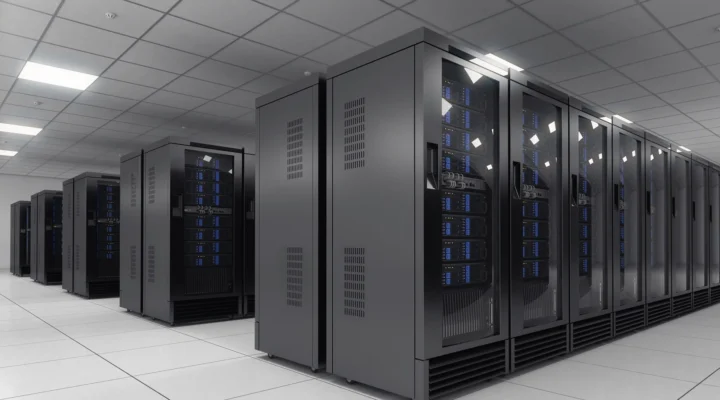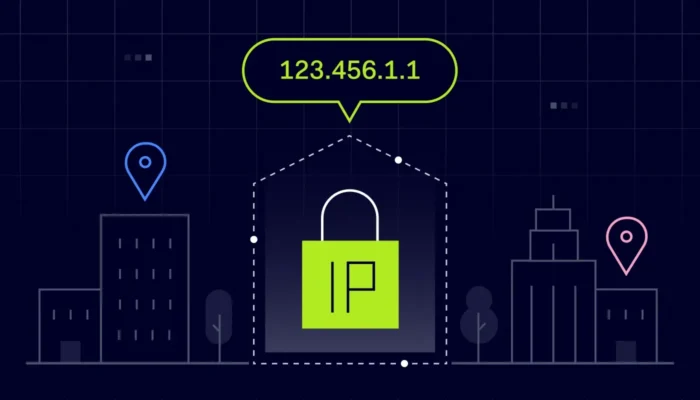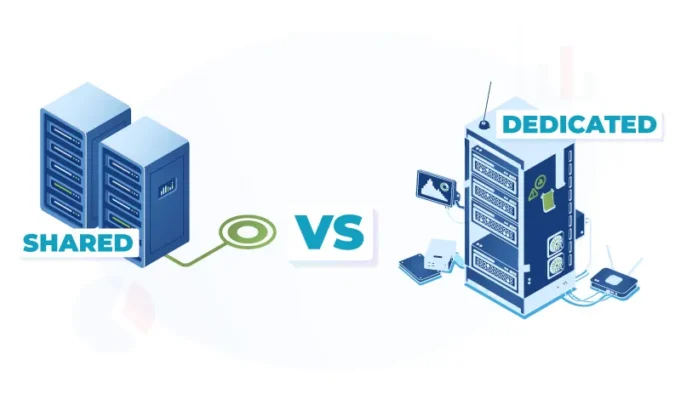Ever wondered what powers those lightning-fast, reliable websites and applications? Often, the answer lies in a dedicated server. Unlike sharing resources with others, a dedicated server gives you the entire physical server all to yourself. But what exactly does that mean, and is it the right choice for your needs? Let’s dive in and explore the world of dedicated servers in plain and simple terms!
What is a Dedicated Server?
Imagine owning an entire building versus renting an apartment. With a dedicated server, you’re the sole tenant of a powerful physical machine housed in a data center. This means all the server’s resources – its processor (CPU), random access memory (RAM), hard drive space, and network connection – are dedicated solely to your use. No other website or application competes for these resources.
This exclusive access is the defining characteristic of a dedicated server. In contrast to shared hosting, where your website shares server resources with numerous others, or Virtual Private Servers (VPS) which partition a single physical server into multiple virtual environments, a dedicated server offers complete isolation and resource availability. This makes it a robust solution for demanding online presences.
Think of a dedicated server as having your own personal supercomputer in a professional data center. You have the keys to the entire system and can configure it precisely to your specifications. This level of control and dedicated power is crucial for applications that require consistent high performance and security without the “noisy neighbor” effect often experienced in shared hosting environments.

How Does a Dedicated Server Work?
A dedicated server operates as a standalone physical computer within a data center, entirely allocated to a single user. It’s connected to the internet through the hosting provider’s network infrastructure, drawing power from the data center’s robust power systems, often backed up by batteries and generators. Unlike shared hosting, all the server’s resources are exclusively yours.
When you access a website or application hosted on your dedicated server, your request travels through the internet to the server. The server’s hardware, including the Central Processing Unit (CPU) for processing tasks and the Random Access Memory (RAM) for actively used data, works to fulfill this request. The storage drives hold the website’s files, applications, and data, which are then delivered back to your browser.
The key is the dedicated nature of these resources. You don’t compete with other users for CPU time, RAM, storage space, or bandwidth. This exclusivity ensures consistent performance and the ability to handle resource-intensive tasks without being affected by others. You also have control over the server’s software, including the operating system and any applications you choose to install, allowing for a highly customized and optimized environment.
Why Choose a Dedicated Server?
Opting for a dedicated server comes with several significant advantages, primarily centered around performance, control, and security. These benefits often make it the preferred choice for businesses and individuals with specific and demanding online requirements. Let’s explore these key advantages in more detail.
Superior Performance and Speed
Because all the server’s resources are dedicated to your use, you experience significantly faster loading times and better performance overall. Your website or application won’t be slowed down by other users consuming server resources. This dedicated power ensures consistent responsiveness, crucial for user experience and SEO rankings.
For example, an e-commerce website experiencing high traffic during a sale would benefit immensely from the dedicated resources of a server, ensuring smooth transactions and preventing slowdowns that could lead to lost sales. Similarly, a complex web application with many concurrent users requires consistent processing power that a dedicated server readily provides.
Unmatched Control and Customization (Root Access)
Dedicated servers typically grant you root access (on Linux systems) or administrator privileges (on Windows systems). This level of access allows you to have complete control over the server environment. You can choose your operating system, install custom software, configure security settings, and tailor the server precisely to your needs.
For instance, a development team might require specific versions of programming languages or libraries that are not available on a shared hosting platform. With root access on a dedicated server, they can install and configure the exact environment they need for their development and testing processes. This level of customization is a significant advantage for those with specific technical requirements.
Enhanced Security and Isolation
With a dedicated server, your environment is isolated from other users. This significantly reduces the risk of security breaches that might originate from compromised accounts on a shared server. You have the freedom to implement your own security measures, firewalls, and intrusion detection systems tailored to your specific security policies.
Consider a financial institution that needs to host sensitive customer data. The isolated environment of a dedicated server provides a much higher level of security compared to shared hosting, where a vulnerability on another user’s site could potentially impact the entire server. This enhanced security is a critical factor for organizations handling sensitive information.
Unique IP Address Advantages
Each dedicated server comes with its own unique Internet Protocol (IP) address. This is beneficial for several reasons. For instance, it’s often a requirement for installing an Secure Sockets Layer (SSL) certificate, which is crucial for encrypting data transmitted between a user’s browser and your server, especially for e-commerce sites.
Furthermore, having a unique IP address helps maintain your website’s reputation. If another website on a shared IP address engages in activities that lead to blacklisting, your site could be negatively affected. A dedicated IP address avoids this “bad neighbor” effect, ensuring your online presence remains reputable and accessible.

Scalability for Growth
While the initial dedicated server provides substantial resources, it also offers scalability for future growth. As your website or application expands, you often have options to upgrade hardware components like RAM, storage, or bandwidth. This allows your infrastructure to evolve with your growing needs without requiring a complete migration to a new server.
For example, a rapidly growing online gaming community might start with a dedicated server configuration suitable for a certain number of players. As the community expands, they can often upgrade the server’s RAM and processing power to accommodate more users without experiencing performance degradation. This scalability makes dedicated servers a future-proof solution for growing online ventures.
Dedicated Server vs. Other Hosting Types
Understanding the differences between dedicated servers and other common hosting types like shared hosting and VPS is crucial in making the right choice for your online needs. Each type offers a different balance of cost, performance, and control.
Dedicated Server vs. Shared Hosting (Key Differences)
Shared hosting is the most basic and often the most affordable type of web hosting. Multiple websites share the resources of a single physical server. This means that CPU time, RAM, and bandwidth are all shared among numerous users. While cost-effective for small websites with low traffic, performance can be affected by other users’ activity. Control is also limited, as users typically cannot install custom software or access server configurations.
In contrast, a dedicated server provides exclusive use of all server resources to a single user. This results in significantly better performance, greater control over the server environment (including the ability to install custom software and configure settings), and enhanced security due to the isolated nature of the hosting. However, dedicated servers are generally more expensive than shared hosting due to the dedicated resources.
For instance, a personal blog with a few hundred visitors a month might be perfectly adequate on a shared hosting plan. However, a popular news website receiving millions of daily visits would likely require the dedicated resources of a dedicated server to handle the traffic and maintain performance.

Dedicated Server vs. VPS Hosting (When to Upgrade)
VPS (Virtual Private Server) hosting sits in between shared and dedicated hosting in terms of cost, performance, and control. With VPS, a single physical server is partitioned into multiple virtual servers, each with its own allocated resources (CPU, RAM, storage). While more powerful and customizable than shared hosting, the underlying physical server’s resources are still being shared, albeit in a more controlled manner.
Upgrading from a VPS to a dedicated server becomes necessary when the allocated resources of the VPS are no longer sufficient to handle your website or application’s demands. This could manifest as slow loading times, frequent crashes during peak traffic, or limitations in installing specific software or configurations. A dedicated server offers the ultimate level of resource availability and control, making it the next logical step for resource-intensive online presences.
Consider a growing e-commerce store that initially launched on a VPS. As their product catalog expands and their customer base grows, they might find that the VPS resources are no longer adequate to handle the increasing traffic and database queries. Upgrading to a dedicated server would provide the necessary resources to ensure a smooth and responsive shopping experience for their customers.
Brief mention of Cloud Hosting as another alternative
Cloud hosting utilizes a network of virtual servers rather than a single physical machine. Resources can be scaled up or down easily based on demand, and you typically only pay for what you use. While offering flexibility and scalability, it differs from a dedicated server in that you don’t have exclusive access to a specific physical machine. Cloud hosting can be a powerful alternative, especially for highly variable workloads.
Who Uses Dedicated Servers?
Dedicated servers cater to a wide range of users and organizations that require a high level of performance, control, and security for their online operations. Here are some common examples:
High-Traffic Websites and Blogs
Websites that experience a large volume of daily or monthly visitors often rely on dedicated servers to ensure consistent performance and prevent slowdowns. News websites, popular blogs, and online communities with significant user activity need the dedicated resources to handle the load effectively.
For example, a major online publication that receives millions of page views per day would likely host its website on one or more dedicated servers to ensure fast loading times and a seamless user experience for their audience. The dedicated bandwidth and processing power are crucial for handling such high traffic volumes.
E-commerce Platforms
Online stores, especially those with a large number of products and transactions, often choose dedicated servers for their reliability, security, and ability to handle fluctuating traffic during sales events. The enhanced security features are also critical for processing sensitive customer and payment information.
Consider a large online retailer during a Black Friday sale. The sudden surge in website traffic and purchase attempts requires robust server infrastructure to maintain performance and ensure secure transaction processing. A dedicated server provides the necessary stability and security for such high-demand scenarios.
Gaming Communities
Online multiplayer games require servers that can handle a large number of concurrent players with low latency. Dedicated servers provide the necessary processing power, memory, and network bandwidth to host these games smoothly, offering a better experience for players.
Think of popular online games where thousands of players interact in real-time. These gaming communities often rent dedicated servers configured specifically for their game to ensure minimal lag and a stable environment for all participants. The dedicated resources are essential for a smooth and enjoyable gaming experience.
Resource-Intensive Applications
Applications that demand significant processing power, memory, or disk I/O (input/output) often require the dedicated resources of a dedicated server. This includes video streaming platforms, data analysis tools, and complex web applications.
For instance, a company providing video editing services online might use a dedicated server to host their platform. The server would need substantial processing power and storage to handle the uploading, editing, and streaming of large video files efficiently.
Businesses with Strict Security Needs
Organizations that handle sensitive data, such as healthcare providers or financial institutions, often opt for dedicated servers to meet stringent security and compliance requirements. The isolated environment and full control over security configurations are key advantages.
A healthcare company that needs to comply with regulations like HIPAA (Health Insurance Portability and Accountability Act) might choose a dedicated server to ensure the privacy and security of patient data. The ability to implement specific security protocols and have an isolated environment is crucial for meeting these compliance standards.
Understanding Dedicated Server Management
The level of management included with a dedicated server can vary significantly between providers, impacting the technical responsibilities that fall on the user. Understanding these different management levels is important when choosing a dedicated server.
Unmanaged Dedicated Servers (For the Tech-Savvy)
With an unmanaged dedicated server, you are responsible for almost all aspects of server administration. This includes the initial setup, operating system installation, security patching, software updates, and ongoing maintenance. This option is typically less expensive but requires significant technical expertise in server management.
For example, a seasoned system administrator or a development team with strong DevOps capabilities might opt for an unmanaged server. They have the skills to configure and maintain the server according to their specific needs and can often prefer the greater control this option provides.
Managed Dedicated Servers (Support and Convenience)
A managed dedicated server includes some level of support from the hosting provider. This often covers tasks such as initial server setup, basic security configurations, and monitoring. The extent of management can vary, so it’s important to understand what services are included. This option is suitable for those with some technical knowledge but who prefer to offload certain administrative tasks.
Consider a small business that needs a dedicated server for their e-commerce site but doesn’t have a dedicated IT staff. A managed dedicated server would allow them to benefit from the power and security of a dedicated server while having the hosting provider handle essential maintenance and support.
Fully Managed Options
A fully managed dedicated server provides the most comprehensive level of support. The hosting provider typically handles almost all technical aspects, including server setup, security hardening, software installation and updates, proactive monitoring, and troubleshooting. This option allows you to focus entirely on your website or applications without needing extensive server management skills.
For instance, a marketing agency hosting multiple client websites on a dedicated server might choose a fully managed option. This allows them to ensure their clients’ sites are running smoothly and securely without needing to dedicate significant time and resources to server administration.
Is a Dedicated Server Right For You? (Key Considerations)
Deciding whether a dedicated server is the right hosting solution involves evaluating your specific needs and resources. Consider the following factors to help you make an informed decision:
Your Website/Application Needs (Traffic, Resources)
If your website or application experiences high traffic volumes or requires significant processing power, memory, or storage, a dedicated server is likely a good fit. Evaluate your current resource usage and anticipated growth to determine if you’ve outgrown shared or VPS hosting.
For example, if your e-commerce site regularly experiences slowdowns during peak hours, or if your web application struggles to handle the number of concurrent users, it might be time to consider the dedicated resources of a dedicated server.
Your Technical Expertise
Managing a dedicated server, especially an unmanaged one, requires a certain level of technical skill. If you or your team lack experience in server administration, you’ll need to factor in the cost of a managed or fully managed service, or the cost of hiring someone with the necessary expertise.
Consider a small business owner who is not technically inclined. While they might need the performance of a dedicated server, they would likely benefit more from a managed or fully managed option where the hosting provider handles the technical complexities.
Your Budget
Dedicated servers are generally more expensive than shared or VPS hosting due to the dedicated resources they provide. Evaluate your budget to determine if the cost aligns with the benefits a dedicated server offers for your specific needs.
While a dedicated server offers superior performance and control, it comes at a higher price point. Carefully weigh the cost against the potential benefits, such as increased revenue from a faster e-commerce site or improved user experience on a high-traffic platform.
Key Takeaways: When to Consider a Dedicated Server
In summary, consider a dedicated server if:
- You require high performance and speed for a high-traffic website or demanding application.
- You need full control and customization of the server environment, including root access.
- You prioritize enhanced security and isolation for sensitive data or compliance requirements.
- You need the reliability and stability that comes with dedicated resources.
- You anticipate significant growth and need a scalable hosting solution.
By understanding what a dedicated server is, its benefits, and when it’s the right choice, you can make an informed decision that best suits your online needs and goals.
